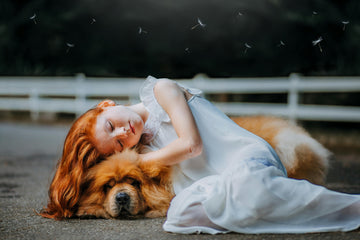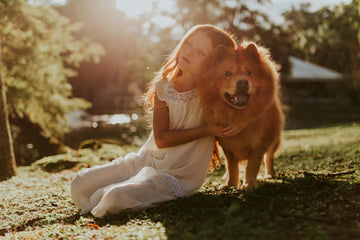Dogs do many things that make us laugh, scratch our heads, or worry. Shaking is one of those behaviors that can have multiple meanings. While an occasional shiver might be nothing more than excitement, frequent or unexplained shaking can signal a deeper issue. If you’ve ever asked, “Why is my dog shaking?” you’re not alone. This common question worries dog owners everywhere, and the answer varies depending on your pup's age, breed, environment, health status, and emotional state.
This article explores the most common reasons why dogs shake, how to distinguish between harmless and serious causes, and what steps you should take if your dog won't stop shaking.
1. Understanding the Different Types of Shaking in Dogs
Before jumping to conclusions, it's helpful to understand the types of shaking your dog might experience:
✔️ Full-body trembling: Involuntary shivering across the body
✔️ Localized twitching: Often isolated to legs or head
✔️ Intermittent shaking: Comes and goes throughout the day
✔️ Persistent shaking: Doesn’t stop or worsens over time
Recognizing the pattern can help your vet diagnose the cause more accurately.

2. Harmless Reasons Why Your Dog Might Be Shaking
Let’s start with the less alarming causes of shaking. These are generally not emergencies, though they still deserve attention.
1. Excitement or Anticipation
Many dogs shake when they get excited. This might happen when you come home, before a walk, or during playtime.
Signs of excitement shaking:
✔️ Wagging tail
✔️ Alert ears
✔️ Bouncing or jumping behavior
✔️ Quick recovery after the event
2. Cold or Wet Conditions
Just like humans, dogs can get cold. Small breeds, short-haired dogs, puppies, and senior dogs are especially susceptible.
How to help:
✔️ Provide a warm blanket or dog sweater
✔️ Keep your dog dry after walks in the rain or snow
✔️ Adjust the thermostat indoors if necessary
3. Dreaming or Sleep Twitches
Dogs dream, and during REM sleep, it’s common for them to twitch or shake. This is usually nothing to worry about.
Signs it’s just a dream:
✔️ Happens during sleep only
✔️ Dog seems relaxed or makes small noises
✔️ Stops as soon as they wake up
4. Response to Fear or Anxiety
Shaking is a common anxiety response in dogs. Loud noises like fireworks, thunderstorms, or even unfamiliar environments can trigger trembling.
What to look for:
✔️ Pacing or hiding
✔️ Ears back and tail tucked
✔️ Whining or yawning
✔️ Avoiding eye contact
Solutions:
✔️ Provide a safe space, like a crate or covered area
✔️ Use anxiety wraps like ThunderShirt
✔️ Try calming supplements or vet-recommended CBD oil

3. Medical Reasons Why Dogs Shake
Now let’s move into more serious causes. If your dog is shaking frequently and doesn’t seem cold, excited, or scared, there could be a medical issue behind it.
1. Pain or Injury
Dogs can’t tell us when they’re in pain, so shaking may be a silent sign of discomfort. It could result from an injury, arthritis, or internal condition.
Check for:
✔️ Limping or favoring one leg
✔️ Sensitivity to touch
✔️ Whining or growling when moved
2. Poisoning or Toxin Ingestion
If your dog has ingested something toxic, shaking can be an early warning sign. Common household poisons include chocolate, xylitol (found in sugar-free gum), certain plants, and cleaning products.
Other symptoms:
✔️ Vomiting or diarrhea
✔️ Excessive drooling
✔️ Seizures or collapse
Take action:
✔️ Call your vet or poison control immediately
✔️ Bring the suspected toxin label (if known)
3. Seizures and Neurological Conditions
Shaking could also be a symptom of a seizure disorder or another neurological issue, such as epilepsy.
Signs include:
✔️ Collapsing
✔️ Unresponsiveness
✔️ Paddling legs or drooling
✔️ Confusion post-episode
If your dog has experienced seizures, your vet may suggest medications and regular monitoring.
4. Canine Distemper (Especially in Puppies)
Distemper is a highly contagious viral disease that can cause tremors, along with fever, coughing, and nasal discharge. It mainly affects unvaccinated puppies.
Prevention:
✔️ Ensure your puppy receives all core vaccines
5. Old Age or Muscle Weakness
Older dogs may develop tremors due to muscle degeneration or conditions like Canine Cognitive Dysfunction (doggy dementia).
What helps:
✔️ Joint supplements like glucosamine
✔️ Comfortable orthopedic dog beds
✔️ Gentle exercise and vet-approved therapies

4. Breed-Specific Reasons for Shaking
Some dog breeds are more prone to shaking due to their genetics and temperament.
1. Small Breeds
Chihuahuas, Yorkies, and Toy Poodles often shake more than larger breeds. This is often due to:
✔️ Higher metabolism
✔️ Sensitivity to cold
✔️ Nervous energy
2. White Dog Shaker Syndrome
This is a condition common in small white dog breeds like Maltese and West Highland Terriers. It causes full-body tremors usually starting between 6 months and 3 years of age.
Treatment:
✔️ Steroids like prednisone (vet-prescribed)
✔️ Anti-inflammatory medications
3. Working and Herding Breeds
Some dogs shake in anticipation of doing a task. Border Collies or Australian Shepherds may tremble with excitement or focus.
5. When You Should Be Concerned
If your dog is shaking and shows any of the following symptoms, it’s time to call the vet:
✔️ Shaking combined with vomiting or diarrhea
✔️ Collapse or fainting
✔️ Trouble walking or coordination loss
✔️ Whining, yelping, or signs of pain
✔️ Inability to eat or drink
✔️ Pale gums or rapid breathing
Emergencies:
✔️ Seizures lasting more than 5 minutes
✔️ Suspected poisoning
✔️ Shaking with a bloated abdomen (risk of bloat)

6. What to Do If Your Dog Is Shaking
Here’s a practical step-by-step plan:
Step 1: Assess the Situation
✔️ Is your dog cold? Wrap them in a warm blanket.
✔️ Are they scared? Remove the stressor or relocate them to a quiet place.
✔️ Are they excited? Let them settle down with soft praise.
Step 2: Look for Other Symptoms
✔️ Vomiting, drooling, or difficulty breathing?
✔️ Pale gums or lethargy?
Step 3: Check for Injuries
✔️ Gently touch legs, back, and belly to assess for pain
Step 4: Contact Your Vet
If the shaking is persistent or paired with other symptoms, call your vet. Take note of:
✔️ When it started
✔️ How long it lasts
✔️ Anything your dog ate or encountered recently
Step 5: Follow the Vet’s Advice
Treatment may include:
✔️ Anti-anxiety meds
✔️ Pain relief
✔️ Blood tests
✔️ Imaging (X-rays, ultrasound)
7. How to Prevent Shaking in the Future
While not all causes can be prevented, here are tips to reduce risk:
✔️ Keep your dog warm in cold weather
✔️ Avoid known toxins (chocolate, xylitol, onions)
✔️ Provide regular exercise to manage energy
✔️ Visit the vet regularly for wellness exams
✔️ Socialize and desensitize your dog to loud noises
For anxiety-prone dogs, consider:
✔️ Dog pheromone diffusers
✔️ Behavioral training
✔️ Calming music or white noise

Conclusion
So, why is your dog shaking? It could be anything from pure excitement to a serious medical issue. The key is to observe the context, check for other symptoms, and don’t panic. Trust your instincts as a dog parent—if something feels off, get professional advice.
Your dog depends on you to notice when something’s wrong. By staying informed and proactive, you’re giving them the best care possible.

Frequently Asked Questions (FAQs)
1. Can stress cause my dog to shake?
Yes. Dogs often shake when they’re anxious, especially during fireworks, thunderstorms, or unfamiliar experiences.
2. What should I do if my dog is shaking and won’t stop?
Monitor them closely, check for injuries or other symptoms, and contact your vet for guidance.
3. Do dogs shake when they have a fever?
Yes, fever or illness can cause shivering. Take their temperature with a pet-safe thermometer.
4. Is it normal for puppies to shake?
Some shaking is normal in very young puppies. However, persistent trembling should be checked by a vet.
5. How do I calm a shaking dog?
Use a calm voice, provide warmth, and offer comfort. In anxiety-related cases, calming supplements or wraps may help.







